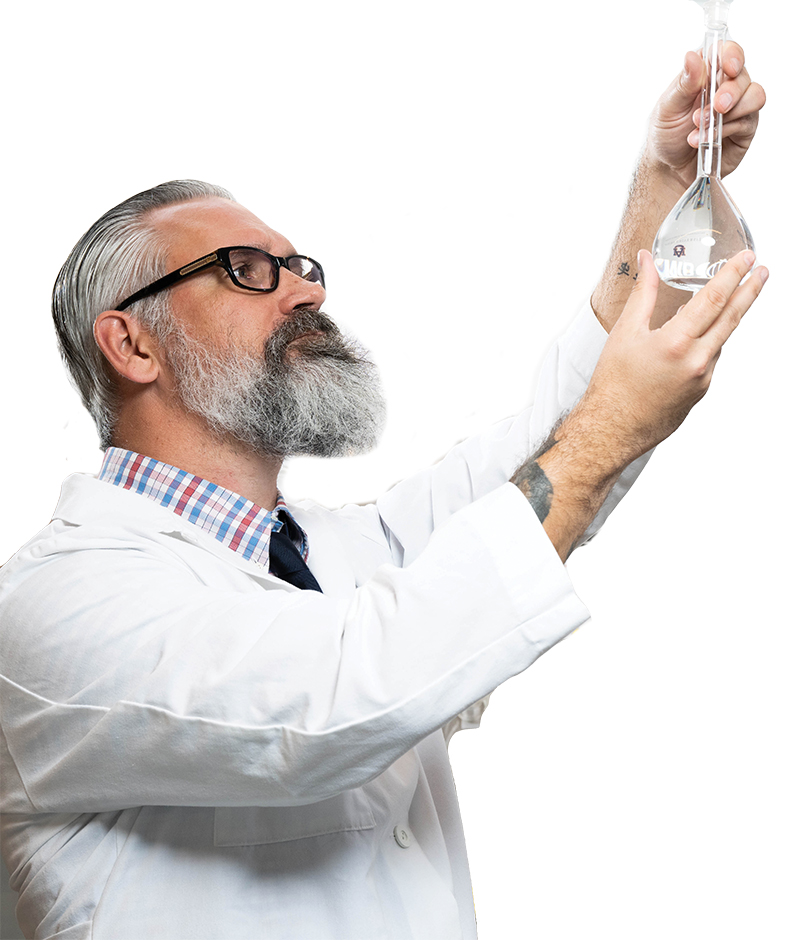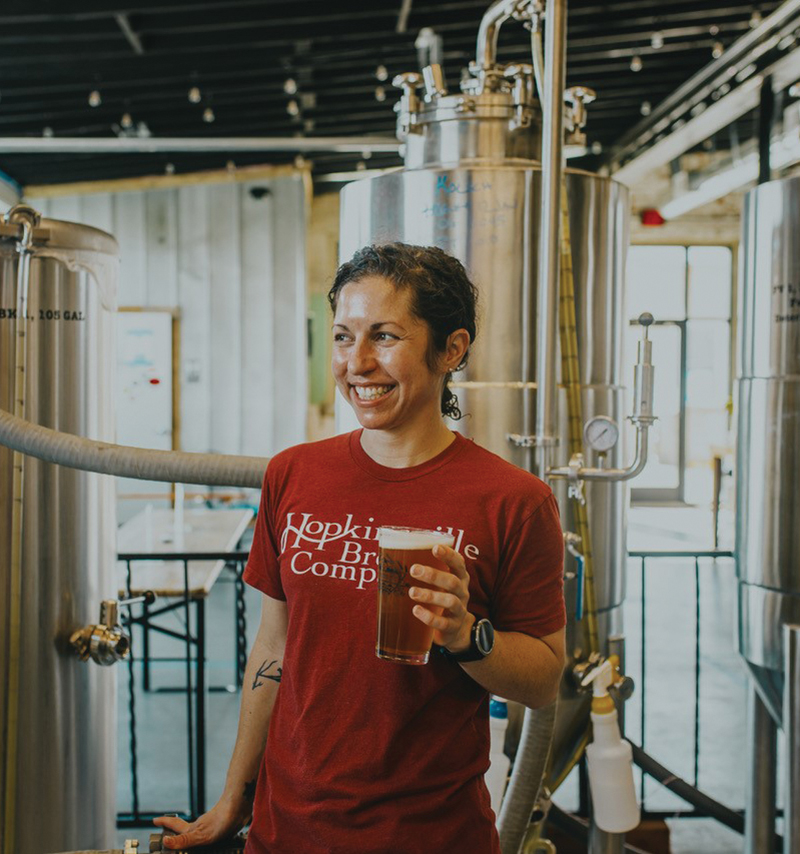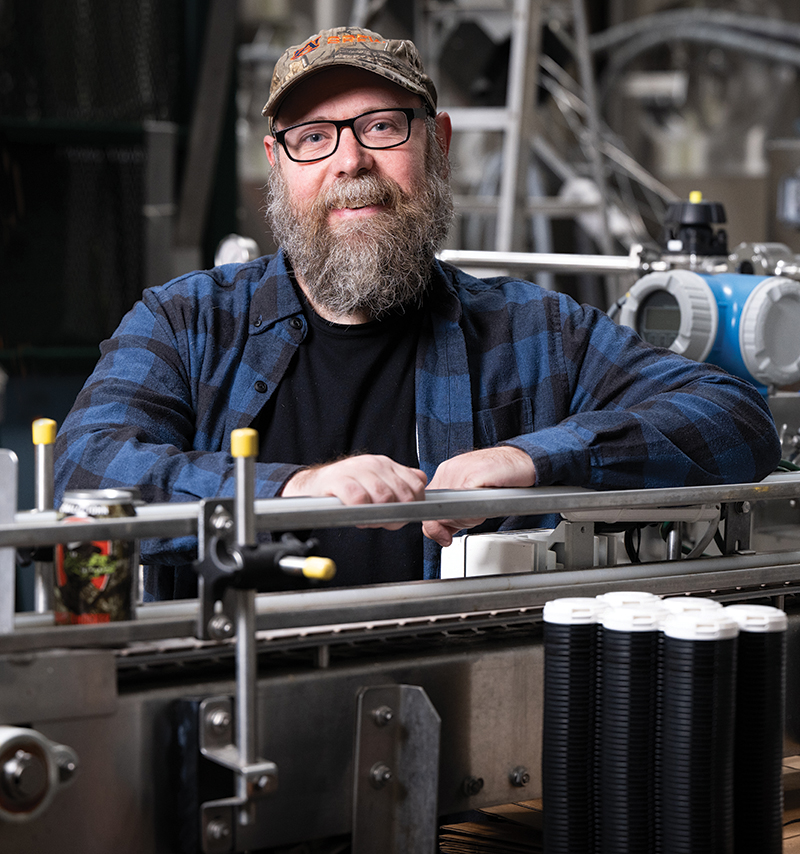Since 2014, Auburn brewing science graduates have served up some of the tastiest pints in bars across the country. With Auburn’s new Tony and Libba Rane Center, brewing’s future on the Plains is golden.
By Rob Lee ’14
In 2013, when Governor Robert Bentley legalized home brewing in Alabama (the last state to do so), it took Auburn only a few months to enlist its first class in brewing science and operations.
An online program at the time, the one-year master’s certificate was created for candidates who were interested in the science, business and technicalities of brewing. Although several other schools in the country had similar programs at the time, Auburn was the first to offer anything like it in the Southeast.
As the first class graduated in 2015, Head of the School of Hospitality Martin O’Neill was already contemplating a master’s degree option, but lacked the facilities to start the program.
Initially formed under the Department of Nutrition, Dietetics and Hospitality Management, the brewing science program was at a standstill. Until the Rane Culinary Science Center was opened in fall 2022.
The Rane of Brewing Science
The center also houses additional academic programs, including an extensive bachelor’s program in hospitality management. In addition to the beer-education arm, O’Neill said there is a wine education and distilled spirits lab. A micro-distillery is also in progress, where students will be able to distill spirits and use them for sensory evaluation purposes.
As the program expanded to include the master’s degree in 2021, O’Neill hired Clark Danderson as the director of brewing science and operations. A botanist by trade, Danderson has three degrees in plant biology and received the brewing science certificate in 2021 prior to taking on the director role.
“Part of what we’ve also done is develop a brewing science laboratory,” Danderson said while discussing the program’s expansion. “We have a lot of equipment that allows us to do analytical services for the local and more regional craft beer industry. Basically a brewer can sit there and say ‘Well, my beer isn’t coming out the way that it should.’ And they can send me a can or a bottle and I can tell them everything they need to know about what is going on in the beer.” Danderson expects the analytical services to come online to the general public this spring.

Clark A. Danderson ‘21, assistant professor and director of brewing science and operations, checks ingredients inside the Rane Culinary Science Center Microbrewery.
Danderson said the program also wants to utilize beer and food pairings at events that would be able to generate funds and create local interest in the community.
“Because it is a graduate program, and now that it has a place at the Rane Center, we definitely want to be more front forward with the community and be amiable with the community, for those that are the beer enthusiasts and those that are thinking more of a professional kind of background,” Danderson said.
Glass Half Full
“The biggest difference now is that we can spend time with students in three dimensions,” said Harbert Eminent Scholar & Professor of Management Dave Ketchen. “I can’t overstate how exciting it is to be able to bring people to campus, give them the full Auburn Family experience, brew beer with them side by side and learn about their lives and their challenges. It’s just going to be an amazing experience.”
Ketchen teaches the business of brewing, a class designed to help someone start a brewery or take an existing brewery and expand it. The class culminates with a business plan students develop over the course of 15 weeks.
“Every now and then I’ll hear from students who say ‘Hey, I executed my business plan and I’ve got my expansion done and I really appreciate your help.’ When people close the loop like that it’s super rewarding,” Ketchen said.

Kate Russell ’18
Kate Russell ’18 is founder of Hopkinsville Brewing Company and one of those students Ketchen mentored. Russell utilized her business plan she created in class to help expand her brewery in Hopkinsville, Ky.
“I actually did what I set out to do in my business plan,” Russell said. “As soon as we opened I actually texted [Ketchen] a selfie and I was like ‘Hey look what I did.’ I give Dave so many props.”
Russell began her brewery career with her then-husband, but when she had to decide between her house or the brewery in her divorce proceedings, Russell’s son told her, “Mommy, you need a job.” Russell decided she could always find another place to live, but the brewery was staying with her.
“We bought a building in downtown Hopkinsville because downtown was dying, it was very cheap and it was a really small building and a project we could handle ourselves for the most part,” Russell said.
When the Army decided to retain her then husband in 2015, just a week after the brewing equipment arrived, she realized she needed a little more experience before operating a production brewery. “I’m looking at this equipment, it was a two-and-a-half- barrel brewhouse, and I’m like ‘Oh dear, I don’t know how to brew.’ It seemed like a great idea at the time, but this is a terrible idea,” Russell said.
With her life savings and a home equity loan from her parents, Russell set out to continue what she had started and opened the doors to Hopkinsville Brewing Company on Labor Day in 2016. The only brewery in Christian County, Ky., Hopkinsville Brewing Company is now a community hotspot for those looking for a cold pint.
Fast-forward to 2021. Russell is the head brewer, drinking coffee early before her kids were up. Her phone rang during a hectic brew day. While she answered hesitantly, she heard the woman on the phone say, “Sam Adams,” giving her a little more encouragement to pay attention to the call. “My first thought was ‘This is the worst joke ever.’ Like who is pranking me?”
Russell was selected for an “experienceship,” a program where Sam Adams coordinates with Russell to connects her with resources from their own brewery in hopes of helping her with her own. A specific question related to electric-run brew kettles? Sam Adams finds the right person in their company for her to talk with.
Ultimately, in addition to advice from one of the largest craft breweries in the country, Russell worked on a collaboration brew that was served at the Hopkinsville in both her own and the Sam Adams tap rooms. “It was a really neat experience,” Russell said. She was the eighth recipient to ever receive the award.

Will Burgan ’22
Will Burgan, ’22, certificate graduate and dean of general education and academic support at Columbus Technical College, is the assistant brewer for Omaha Brewing Company, a short 45-minute drive from Auburn.
“There are a lot of schools that have online brew programs, and not to knock their programs—I’m sure there are some great programs out there—but being someone who works in academics day in and day out, I know the value of the name of the college and university,” he said.
Not only does the program bring opportunity for economic empowerment in Alabama, Burgan said, but awareness to how beer can be integrated positively in the community.
“There’s always some degree of skepticism whenever alcohol is involved, and there are probably some members of the community who are concerned about a brewery coming to downtown Auburn, but I think they’re going to find it’s going to make a fantastic addition to the culture and to the business community and the product is going to be fantastic,” Ketchen said.

Pints on the Plains
While O’Neill didn’t confirm whether Auburn’s newest brewery would be brewing an official beer for the university, Danderson said it’s good to have a commercial partner with that potential.
“What we’re hoping to do, eventually, is to not only have our beer sold in our facilities, but to have Auburn beer sold at sporting events and then even locally on the shelves.” We can all raise a glass to that.
The Burt Reynolds Look-alike
In the late 1960s an Auburn defensive lineman was the spitting image of heartthrob actor Burt Reynolds.
Refining the Retail Experience
Patrick Klesius ’98 uses data analytics to help top-line jewelry and fashion brands reach customers like never before.
We Were CAPERS
From the 1960s to the 1980s, Auburn’s all-female military auxiliary instilled discipline and service, paving the way for future equality in the nation’s armed forces and preparing them for a lifetime of success.
The Burt Reynolds Look-alike
In the late 1960s an Auburn defensive lineman was the spitting image of heartthrob actor Burt Reynolds.
Refining the Retail Experience
Patrick Klesius ’98 uses data analytics to help top-line jewelry and fashion brands reach customers like never before.
We Were CAPERS
From the 1960s to the 1980s, Auburn’s all-female military auxiliary instilled discipline and service, paving the way for future equality in the nation’s armed forces and preparing them for a lifetime of success.


